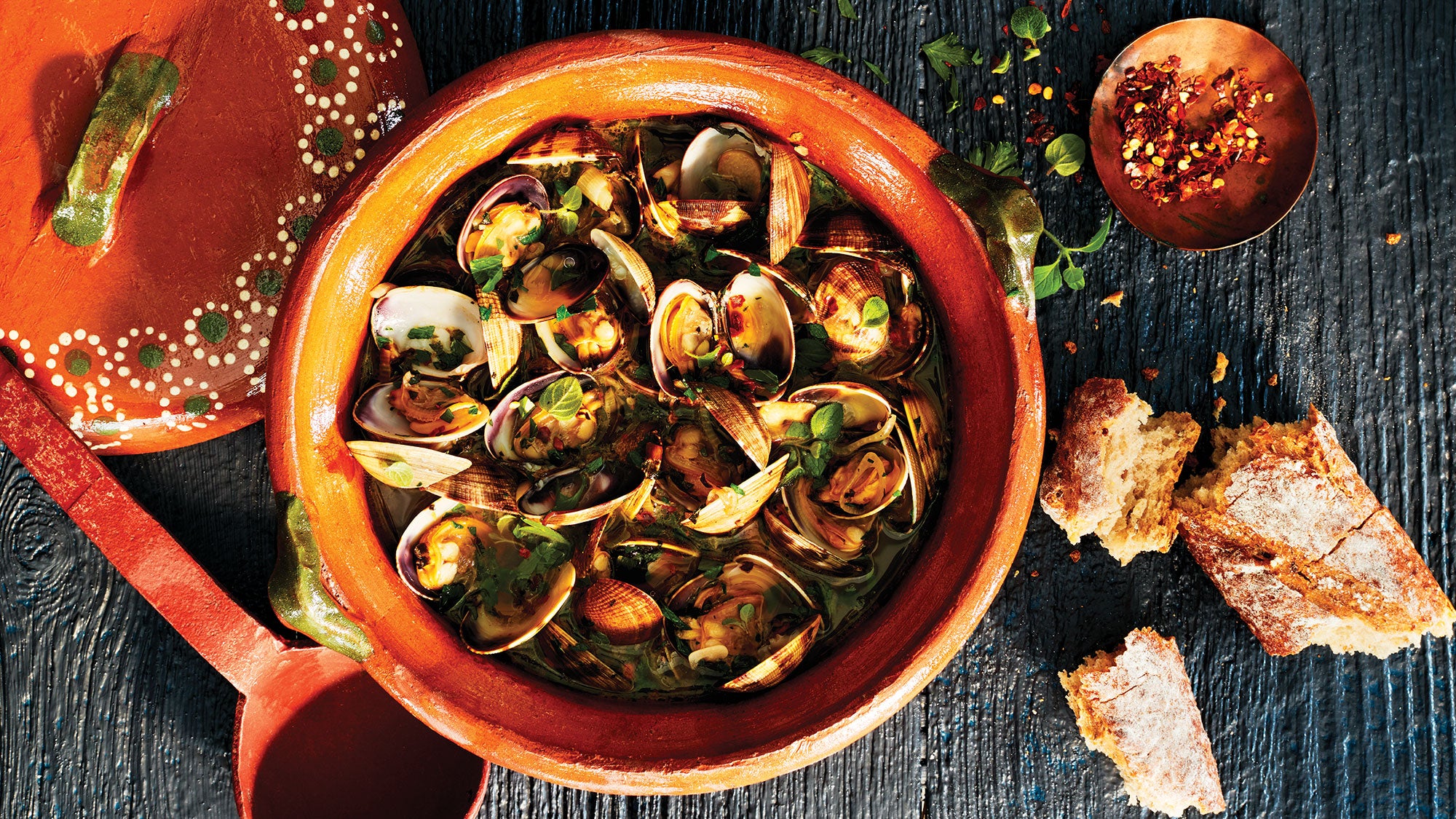Start the Year Energized & Stress-Free With B Vitamins

Vitamin B-rich clams cooked with salsa verde & sherry (Photo: Photography by Ronald Tsang)
No matter how healthy your diet, occasional lifestyle excesses can take their toll. Stress, certain ailments like celiac or Crohn’s disease and excess alcohol consumption deplete nutrients, especially B vitamins — crucial for metabolism, energy and brain function — which can leave you feeling drained, moody, foggy and fatigued.
As a group, the eight B vitamins are critical for a variety of physiological functions: They have been found to play a role in cell proliferation, metabolism, red blood cell and DNA formation, neurotransmitter production and immune function. Some B vitamins are crucial for nervous system function, brain health and mood — especially important during these stress-filled days. Research shows that low levels or deficiencies of certain B vitamins have been linked with an increased risk of depression, irritability and mood problems, and several studies suggest that getting sufficient levels of B vitamins — especially folate, B12 and B6 — can enhance mood, lower stress and improve overall quality of life.
Most B vitamins are abundant in food, but some groups of people are at higher risk for deficiencies. Because B12 is found mostly in animal foods, vegans may not get enough. Pregnant women need more B vitamins, especially B6, B12 and folate, for proper fetal development and to minimize risk of birth defects. Deficiencies in B vitamins, especially B6, B12 and folate, are common in the elderly, and certain health conditions like Crohn’s, celiac disease or common genetic mutations can impact B-vitamin absorption and may lead to deficiencies. Some medications, including birth control pills, may deplete your body of B vitamins, including B6, B12 and folate.
This year, protect your mood. Fill your plate with these seven foods high in B6, B12 and folate.
Spinach
Spinach is especially rich in folate, as well as vitamin B6. Other leafy greens, like collards, kale and turnip greens are also folate-rich. Because some folate may be lost during cooking, focus on lightly steamed greens, or eat them raw in salads.
Try This:
- Toss baby spinach with chickpeas, red onions, radishes and a creamy yogurt dressing.
- Stir shredded spinach leaves into kidney bean soup after cooking to preserve nutrients.
Lentils
Lentils are loaded with folate, with good amounts of B6 and other B vitamins. Edamame, chickpeas, black beans, pinto beans and kidney beans are also great plant-based sources of folate and B6.
Try This:
- Toss black lentils with cubed turkey breast, diced red peppers, shredded greens and olive oil.
- Simmer lentils, potatoes and leeks in broth and add chopped chard during the last few minutes of cooking.
Clams
Clams are exceptionally high in B12, with roughly 84 micrograms — approximately 35 times the FDA recommended dietary allowance — in a three-ounce serving. Oysters and mussels are also excellent sources of B12, with smaller amounts of folate and B6.
Try This:
- Steam clams and serve with garlic-paprika butter.
- Heat canned clams with garlic, red pepper flakes, shallots and olive oil and toss with cooked pasta.
Related: Clams in Salsa Verde with Sherry
Sunflower Seeds
Sunflower seeds are rich in B6 and folate, as well as other B vitamins.
Try This:
- Grind raw sunflower seeds, dates, cacao nibs and vanilla extract in a food processor and form into balls.
- Combine sunflower seeds, pumpkin seeds, coconut flakes and honey and bake for grain-free granola.
Swiss Cheese
Swiss cheese is high in B12; one slice has about one-third of the daily value. Other good cheese and dairy sources of B12include Greek yogurt, cottage cheese and whey protein.
Try This:
- Bake eggs, shredded Swiss cheese, minced kale and red onions in muffin tins for an on-the-go frittata.
- Layer sliced Swiss cheese, sliced turkey and baby spinach, spread with mustard and roll up.
Turkey
Turkey is a great source of B12 and B6; white meat portions are less plentiful in these B vitamins than dark.
Try This:
- Make meatballs with ground turkey, minced onions and garlic and simmer in tomato sauce.
- Toss cooked turkey breast with shredded chard, diced tomatoes, black olives and red onions.
Related: 9 Flavorful, Fat-Burning Lentil Recipes
Nutritional Yeast
Nutritional yeast is loaded with naturally occurring B vitamins, especially B6; most varieties are also fortified with B12, so they’re an outstanding vegan source of B vitamins.
Try This:
- Toss popcorn with olive oil, garlic salt, dried rosemary and nutritional yeast.
- Grind nutritional yeast, raw sunflower seeds and coconut oil in a food processor for vegan cheese.
B-Vitamin Basics: Why It’s a Little Complex
As a group, B vitamins play a role in dozens of crucial physiological processes. But it’s a little complex. Here’s what you need to know:
Bs are both named and numbered, from 1 to 12; gaps in the sequence of numbering occurred because some vitamins, like B4, were later dropped when researchers discovered they didn’t meet the criteria of a “vitamin.” Four other substances – choline, PABA, inositol and lipoic acid – are also included in the B-complex group, since they have similar properties, though they’re not technically vitamins. Some are better known by their names, like folate and thiamine, and others by their numbers, like B12. The eight “official” B vitamins are:
- B1 – thiamine
- B2 – riboflavin
- B3 – niacin
- B5 – pantothenic acid
- B6 – pyridoxine
- B7 – biotin
- B9 – folate
- B12 – cobalamin